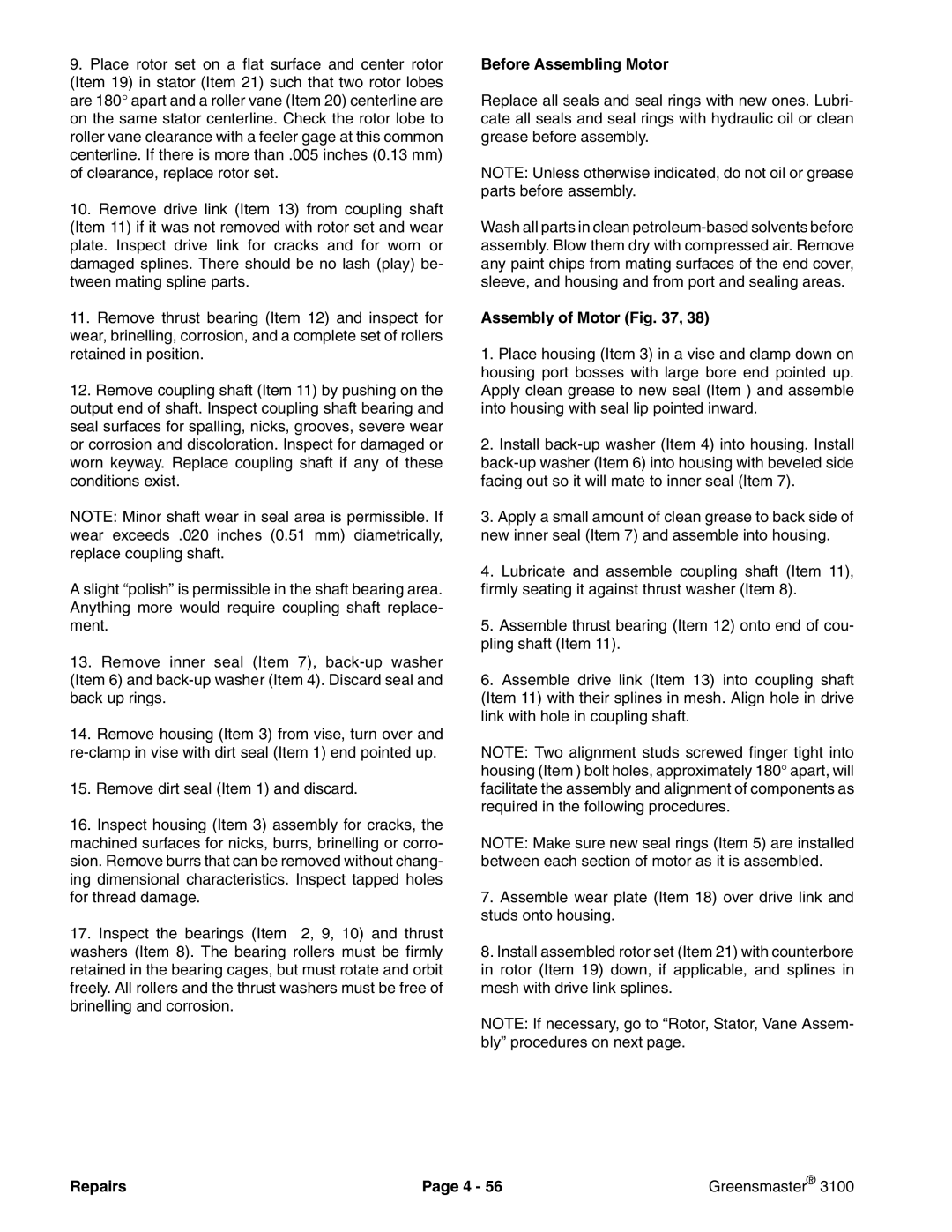9.Place rotor set on a flat surface and center rotor
(Item 19) in stator (Item 21) such that two rotor lobes are 180° apart and a roller vane (Item 20) centerline are on the same stator centerline. Check the rotor lobe to roller vane clearance with a feeler gage at this common centerline. If there is more than .005 inches (0.13 mm) of clearance, replace rotor set.
10.Remove drive link (Item 13) from coupling shaft (Item 11) if it was not removed with rotor set and wear plate. Inspect drive link for cracks and for worn or damaged splines. There should be no lash (play) be- tween mating spline parts.
11.Remove thrust bearing (Item 12) and inspect for wear, brinelling, corrosion, and a complete set of rollers retained in position.
12.Remove coupling shaft (Item 11) by pushing on the output end of shaft. Inspect coupling shaft bearing and seal surfaces for spalling, nicks, grooves, severe wear or corrosion and discoloration. Inspect for damaged or worn keyway. Replace coupling shaft if any of these conditions exist.
NOTE: Minor shaft wear in seal area is permissible. If wear exceeds .020 inches (0.51 mm) diametrically, replace coupling shaft.
A slight “polish” is permissible in the shaft bearing area. Anything more would require coupling shaft replace- ment.
13.Remove inner seal (Item 7),
14.Remove housing (Item 3) from vise, turn over and
15.Remove dirt seal (Item 1) and discard.
16.Inspect housing (Item 3) assembly for cracks, the machined surfaces for nicks, burrs, brinelling or corro- sion. Remove burrs that can be removed without chang- ing dimensional characteristics. Inspect tapped holes for thread damage.
17.Inspect the bearings (Item 2, 9, 10) and thrust washers (Item 8). The bearing rollers must be firmly retained in the bearing cages, but must rotate and orbit freely. All rollers and the thrust washers must be free of brinelling and corrosion.
Before Assembling Motor
Replace all seals and seal rings with new ones. Lubri- cate all seals and seal rings with hydraulic oil or clean grease before assembly.
NOTE: Unless otherwise indicated, do not oil or grease parts before assembly.
Wash all parts in clean
Assembly of Motor (Fig. 37, 38)
1.Place housing (Item 3) in a vise and clamp down on housing port bosses with large bore end pointed up. Apply clean grease to new seal (Item ) and assemble into housing with seal lip pointed inward.
2.Install
3.Apply a small amount of clean grease to back side of new inner seal (Item 7) and assemble into housing.
4.Lubricate and assemble coupling shaft (Item 11), firmly seating it against thrust washer (Item 8).
5.Assemble thrust bearing (Item 12) onto end of cou- pling shaft (Item 11).
6.Assemble drive link (Item 13) into coupling shaft (Item 11) with their splines in mesh. Align hole in drive link with hole in coupling shaft.
NOTE: Two alignment studs screwed finger tight into housing (Item ) bolt holes, approximately 180° apart, will facilitate the assembly and alignment of components as required in the following procedures.
NOTE: Make sure new seal rings (Item 5) are installed between each section of motor as it is assembled.
7.Assemble wear plate (Item 18) over drive link and studs onto housing.
8.Install assembled rotor set (Item 21) with counterbore in rotor (Item 19) down, if applicable, and splines in mesh with drive link splines.
NOTE: If necessary, go to “Rotor, Stator, Vane Assem- bly” procedures on next page.
Repairs | Page 4 - 56 | Greensmaster® 3100 |
